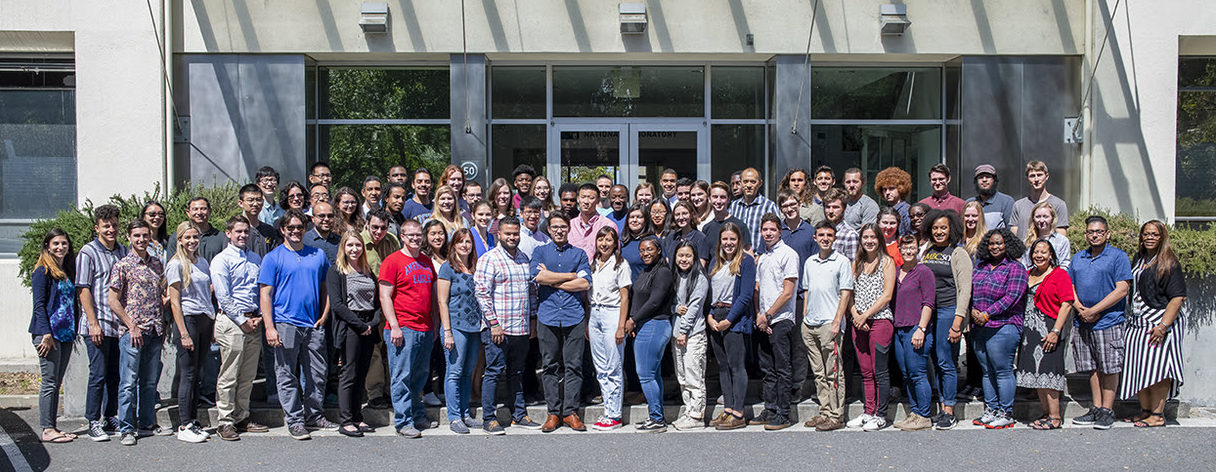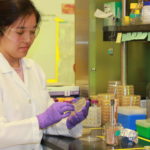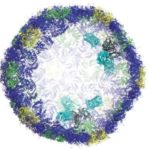 This summer the Biosciences Area has hosted student interns ranging from high school- through graduate school-level. They came to our laboratories through a number of programs dedicated to training the next generation of scientists. Some of our interns took time from their busy summer to share with us highlights of their experiences in the Biosciences Area.
This summer the Biosciences Area has hosted student interns ranging from high school- through graduate school-level. They came to our laboratories through a number of programs dedicated to training the next generation of scientists. Some of our interns took time from their busy summer to share with us highlights of their experiences in the Biosciences Area.
New Methods to Control Bacterial Factories for Biotech Aims
Bacterial microcompartments (BMCs) are organelles that encapsulate portions of metabolic pathways, like miniature factories. They’re found across diverse phyla and do different things depending on the host. Scientists want to retrofit these factories to perform desired functions, such as producing biofuels, industrial materials, or nanoscale medical devices. But current technologies to manipulate BMCs, which consist of an enzymatic core surrounded by a shell made up of protein tiles, have limitations. In a recently published Nature Communications paper, researchers affiliated with Berkeley Lab’s Environmental Genomics and Systems Biology (EGSB) Division and Michigan State’s MSU-DOE Plant Research Laboratory present two new methods they’ve developed to facilitate the construction of synthetic versions.
KBase Flagship Paper Published in Nature Biotechnology
In a letter to the editor published July 6 in Nature Biotechnology, the KBase team presented a comprehensive overview of the platform and an assessment of its scientific impact. The paper describes the unique features and infrastructure of the platform, in addition to highlighting scientific use cases that demonstrate its significance for biology research.
Mortimer Participates at AAAS Forum on Science & Technology Policy
 Jenny Mortimer, Deputy Vice President of the Feedstocks Division at the Joint BioEnergy Institute (JBEI) and Scientist with the Environmental Genomics and Systems Biology (EGSB) Division, participated at a 2018 AAAS Forum on Science & Technology Policy panel entitled “Science Competitiveness in Relation to Public Support for Science”. Panelists discussed how the scientific community must work to maintain societal relevance and build trust. Mortimer presented a code of ethics for scientists recently developed by the World Economic Forum’s Young Scientists community. The code serves as a tool to nurture a positive change of culture in the research world by not only guiding and shaping the behavior of individuals but also the processes of the scientific institutions that are to facilitate this cultural shift.
Jenny Mortimer, Deputy Vice President of the Feedstocks Division at the Joint BioEnergy Institute (JBEI) and Scientist with the Environmental Genomics and Systems Biology (EGSB) Division, participated at a 2018 AAAS Forum on Science & Technology Policy panel entitled “Science Competitiveness in Relation to Public Support for Science”. Panelists discussed how the scientific community must work to maintain societal relevance and build trust. Mortimer presented a code of ethics for scientists recently developed by the World Economic Forum’s Young Scientists community. The code serves as a tool to nurture a positive change of culture in the research world by not only guiding and shaping the behavior of individuals but also the processes of the scientific institutions that are to facilitate this cultural shift.
Women @ The Lab Awards
Six Biosciences employees have been selected by the Women Scientists and Engineers Council (WSEC) and the Diversity, Equity, and Inclusion (DEI) Office for recognition as part of the third Women @ The Lab awards. The program spotlights women at the Lab who demonstrate dedication, talent, STEM contributions, and commitment to the Lab’s mission.
- « Previous Page
- 1
- …
- 28
- 29
- 30
- 31
- 32
- …
- 46
- Next Page »
Was this page useful?







